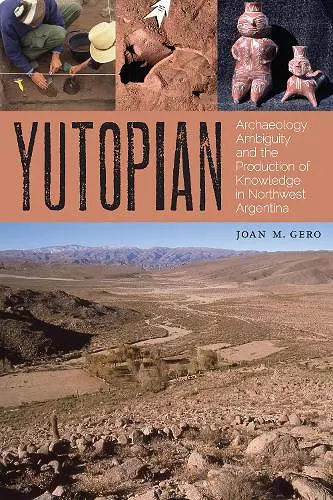Yutopian
Archaeology, Ambiguity, and the Production of Knowledge in Northwest Argentina
Format:Paperback
Publisher:University of Texas Press
Published:18th Nov '15
Currently unavailable, and unfortunately no date known when it will be back

"A beautifully written, honest, and intriguing account ... [that] presents the totality, the all of an archaeological experience, as much as is possible in a written text." -- Benjamin Alberti, Professor of Anthropology and Chair of the Department of Sociology, Framingham State University "A necessary reference for everyone interested in the pre-Hispanic history of the Southern Andes ... [and] an original and important contribution to archaeological theory and practice in general." -- Axel Nielsen, Investigador Principal, CONICET (Consejo Nacional de Investigaciones Cientificas y Tecnicas), Argentina
Around 400 BCE, inhabitants of the Southern Andes took up a sedentary lifestyle that included the practice of agriculture. Settlements were generally solitary or clustered structures with walled agricultural fields and animal corrals, and the first small villages appeared in some regions. Surprisingly, people were also producing and circulating exotic goods: polychrome ceramics, copper and gold ornaments, bronze bracelets and bells. To investigate the apparent contradiction between a lack of social complexity and the broad circulation of elaborated goods, archaeologist Joan Gero co-directed a binational project to excavate the site of Yutopian, an unusually well-preserved Early Formative village in the mountains of Northwest Argentina.
In Yutopian, Gero describes how archaeologists from the United States and Argentina worked with local residents to uncover the lifeways of the earliest sedentary people of the region. Gero foregounds many experiential aspects of archaeological fieldwork that are usually omitted in the archaeological literature: the tedious labor and constraints of time and personnel, the emotional landscape, the intimate ethnographic settings and Andean people, the socio-politics, the difficult decisions and, especially, the role that ambiguity plays in determining archaeological meanings. Gero’s unique approach offers a new model for the site report as she masterfully demonstrates how the decisions made in conducting any scientific undertaking play a fundamental role in shaping the knowledge produced in that project.
"Unlike any monograph I have ever read, it is truly interesting beyond its summary of findings. Each time I pick it up, I find it hard to put down….It is entirely unique." (Vice-president of World Archaeological Congress (WAC))
ISBN: 9780292772021
Dimensions: 229mm x 152mm x 41mm
Weight: 540g
396 pages